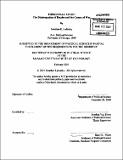Things fall apart : the disintegration of empire and the causes of war
Author(s)
Ladinsky, Jonathan E. (Jonathan Evan)
DownloadFull printable version (45.18Mb)
Other Contributors
Massachusetts Institute of Technology. Dept. of Political Science.
Advisor
Stephen Van Evera.
Terms of use
Metadata
Show full item recordAbstract
This dissertation argues that the disintegration and collapse of empires cause wars and crises by creating some of the conditions and causes of war commonly identified by scholars. When empires disintegrate and collapse, the metropole withdraws its power from its peripheral territories and newly independent successor states emerge. This new situation gives rise to several problems: a power vacuum develops forcing successor states to provide for their own security and leading them and other states to try to fill the vacuum; successor states engage in state-building, which occurs at different rates for different states; ethnic groups are divided from their homelands; multi-ethnic states are created; and, territorial borders become issues of dispute. As a result of these problems,. five causes of war develop, which can lead to wars an crises. International rules of the game become unsettled and ambiguous because a new balance of power develops and new issues of international concern arise. Power shifts as successor states build institutions for self-rule, and alliances form and collapse in response to the ever changing situation. Third, the new situation that occurs as the empire disintegrates increases uncertainty about the capabilities of the successor states, about the alliances that exist, and about the intentions of states, making it difficult to determine the new balance of power and the intentions of other states. Fourth, nationalism grows as states seek to unite with their diaspora and protect them from the discrimination of the multi-ethnic state's government. Fifth, competition for leadership in successor states cause leaders to have a weak hold on power. To test this argument, I look at the seven wars and two crises that occurred when the Ottoman Empire in the Balkans disintegrated in the nineteenth century. This study serve three purposes. First, it studies the causes of war that result from the disintegration and collapse of empires. Second, and more relevant for today's policy-makers, this study can help us understand the consequences of the disintegration of multi-ethnic states and, in the process, provide guidance for policy-makers. Third, this dissertation tests several hypotheses about the causes of war.
Description
Thesis (Ph.D.)--Massachusetts Institute of Technology, Dept. of Political Science, 2001. Includes bibliographical references (p. 391-413).
Date issued
2001Department
Massachusetts Institute of Technology. Department of Political SciencePublisher
Massachusetts Institute of Technology
Keywords
Political Science.